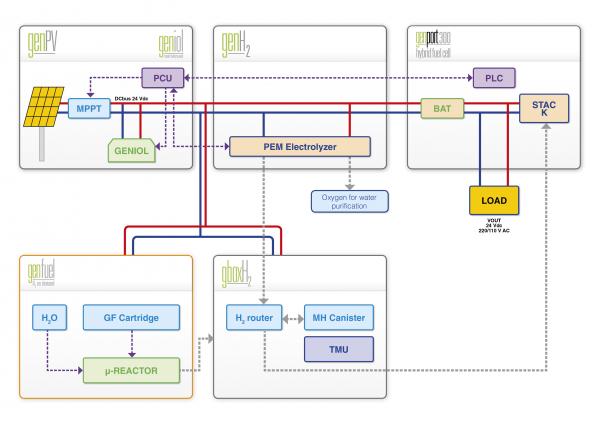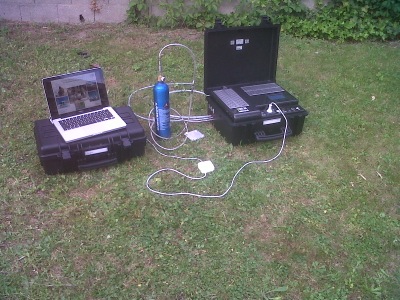Technology
Portable and Stationary Fuel Cell Generators are electrochemical devices that continuously convert the chemical energy of the fuel (hydrogen) and an oxidant (air) into DC electrical energy. Hydrogen-powered fuel cells technology is the most promising alternative to Internal Combustion Engine burning fossil fuels, which generates greenhouse gases and climate changes.
A polymeric membrane fuel cell conventionally comprises a negative electrode (anode) and a positive electrode (cathode) including a suitable catalyst and arranged with a stacked relationship in a polymeric electrolyte. In these cells, hydrogen operates as a fuel and it supplies the anode, whereas oxygen or simply air enters the fuel cell from the cathode side. More specifically, hydrogen atoms are split into protons and electrons which migrate toward the cathode through different paths, protons through the polymeric electrolyte whereas electrons provide a continuous or direct current which can supply an outer circuit. Near the cathode, protons and electrons are recombined with oxygen to again provide water molecules. This reaction is facilitated by the provision of a catalyst, a chemical substance speeding up the process, and intervening into the reaction without being consumed. From a chemical energy to electric energy transforming standpoint, the system can be nearly assimilated to a battery, however it is not subjected to discharges, and the reactor merely produces electric power due to the presence of fuel.
Thus, if the fuel cell is used instead of a secondary battery, the recharging time will be related to the time necessary for replacing the cartridge, instead of several hours which would be necessary for recharging an accumulator pack. Moreover, transforming chemical energy into electric energy, without combustion, provides an absolutely clean and non-polluting process, since the single residue will consists of water steam.

Conventional portable power generators convert chemical energy of the fuel into heat and then to mechanical energy, which is finally converted into electrical energy.
A fuel cell by-passes all these energy conversion processes and provide a reliable, constant supply of electrical energy without moving parts and operating at low temperatures. Proton Exchange Membrane Fuel Cells (PEMFCs) are suitable for portable, stationary, transport energy applications. In hydrogen-based energy systems, Fuel Cells are the technology of choice to maximize the potential benefits in term of energy efficiency, improved energy security and zero-emission.
Lithium-ion batteries (sometimes abbreviated Li-ion batteries) are a type of rechargeable battery in which the cathode (positive electrode) contains lithium, and the anode (negative electrode) is made of a type of porous carbon.
Lithium-ion batteries are common in portable consumer electronics because of their high energy-to-weight ratios, lack of memory effect, and slow self-discharge when not in use. In addition to consumer electronics, lithium-ion batteries usually integrated in packs of several cells are increasingly used in defense, automotive, and aerospace applications due to their high energy density.
However, certain kinds of mistreatment may cause conventional Li-ion batteries to explode. For this reason it is necessary to design an adequate battery management system which ensures the protection and control of the battery pack.
The combination of PEMFC (which mainly provides high energy density) with high power density batteries driven by optimization control algorithms to dispach the requested energy, allows to extend the utilization of electronic equipment in off-grid contests to un-precedent users’ applications.
This is the concept behind our hybrid fuel cell technology.

GENPORT is a worldwide key designer currently bringing into the market advance and cost effective solution for the portable power generation based on this concept.





